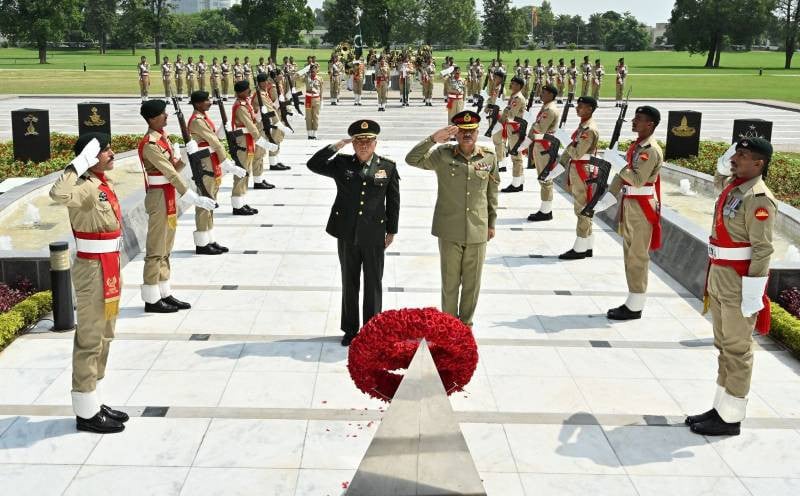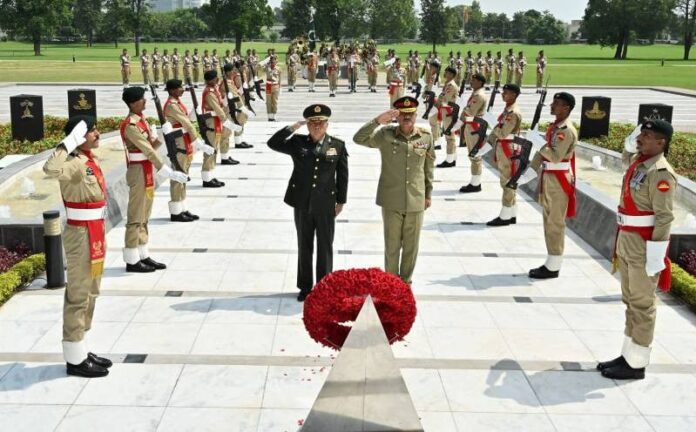COAS General Asim Munir Holds Meeting with General Li Qiaoming, Commander of the PLA Ground Forces
General Asim Munir, the Chief of Army Staff (COAS) of Pakistan, extended a warm welcome to General Li Qiaoming, the Commander of the People’s Liberation Army (PLA) Ground Forces, during a significant visit to the General Headquarters (GHQ) in Islamabad on Monday. This high-profile meeting underscored the deep-rooted military ties and strategic partnership between Pakistan and China.
A High-Level Military Dialogue
The meeting, held at the GHQ, provided a crucial platform for General Asim Munir and General Li Qiaoming to engage in comprehensive discussions on various matters of mutual interest. According to a statement released by the Inter-Services Public Relations (ISPR), the talks covered a broad spectrum of topics, including regional security dynamics, military training programs, and strategies to enhance bilateral defense cooperation.
The dialogue aimed to strengthen the military relationship between the two nations, reflecting the shared commitment to mutual security and stability in the region. Both leaders explored ways to deepen collaboration, ensuring that their respective armed forces remain well-prepared to address emerging security challenges.
Formal Reception and Gestures of Respect
Upon his arrival at the GHQ, General Li Qiaoming was accorded a formal reception that highlighted the significance of his visit. The PLA Ground Forces Commander was greeted with a guard of honor by a meticulously arranged detachment of the Pakistan Army, demonstrating the high regard in which he is held.
In a gesture of deep respect and honor, General Li laid a floral wreath at Yadgar-e-Shuhada, a monument dedicated to the memory of fallen soldiers. This act symbolized the mutual respect and shared values between the two nations, honoring the sacrifices made by their military personnel.
Strengthening Bilateral Defense Cooperation
During the meeting, General Asim Munir emphasized Pakistan’s appreciation for its enduring partnership with China. He reiterated the value that Pakistan places on the brotherly relations between the two countries, which have been built on a foundation of trust, cooperation, and shared interests.

The discussions also focused on enhancing bilateral defense cooperation through collaborative initiatives. Both leaders expressed their commitment to advancing joint military training programs and sharing expertise to bolster the operational capabilities of their armed forces. Such initiatives are designed to foster a closer working relationship and ensure that both nations can effectively address common security challenges.
Commitment to Regional Security
A significant portion of the dialogue centered around regional security concerns. General Asim Munir and General Li Qiaoming explored strategies for improving security and stability in the region. The exchange of views on regional threats and opportunities for cooperation highlighted the strategic alignment of their security interests.
The meeting underscored the importance of ongoing collaboration between Pakistan and China in maintaining peace and stability. Both leaders acknowledged the need for continued engagement and joint efforts to navigate complex regional security dynamics.
Future Prospects
The visit by General Li Qiaoming to the GHQ represents a pivotal moment in the ongoing military cooperation between Pakistan and China. The discussions held and the agreements reached during this high-level meeting are expected to pave the way for further enhancements in defense ties.
As both nations continue to face evolving security challenges, the strengthened partnership between their armed forces will play a crucial role in ensuring regional stability. The mutual commitment to supporting each other and working together on defense matters reflects the enduring strength of the Pakistan-China military relationship.
The successful conclusion of this meeting sets a positive precedent for future engagements and highlights the deep-seated strategic partnership that both countries are committed to nurturing.


